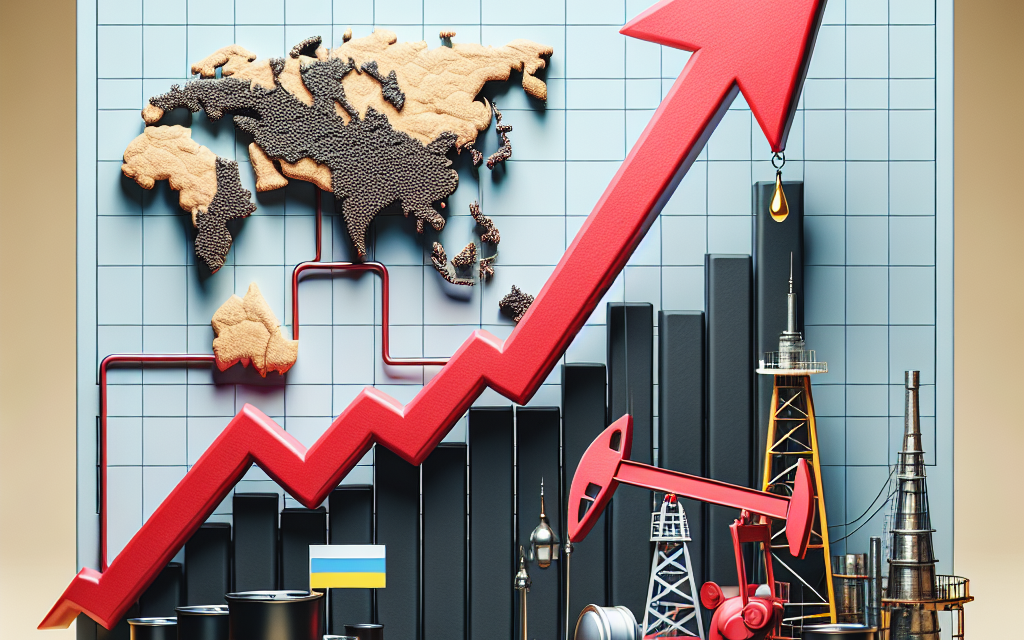“Global Markets on Edge: Oil Prices Surge as Russia-Ukraine Tensions Mount”
Introduction
Oil prices have surged as geopolitical tensions between Russia and Ukraine intensify, raising concerns over potential disruptions in energy supplies. The escalating conflict has heightened fears of supply chain interruptions, given Russia’s significant role as a major global oil producer. Markets are reacting to the uncertainty, with investors closely monitoring the situation for any signs of further escalation that could impact oil exports. This rise in oil prices underscores the vulnerability of global energy markets to geopolitical instability, highlighting the interconnectedness of international relations and economic stability.
Impact Of Russia-Ukraine Tensions On Global Oil Markets
The ongoing tensions between Russia and Ukraine have once again captured global attention, significantly impacting various sectors, particularly the global oil markets. As geopolitical uncertainties intensify, oil prices have experienced a notable surge, reflecting the market’s sensitivity to potential disruptions in supply. This development underscores the intricate relationship between geopolitical events and energy markets, highlighting the vulnerability of global oil supply chains to regional conflicts.
To understand the current situation, it is essential to consider Russia’s pivotal role in the global energy landscape. As one of the world’s largest oil producers, Russia’s influence on global oil prices is substantial. The country’s vast reserves and production capacity make it a key player in the energy sector. Consequently, any instability involving Russia can lead to significant fluctuations in oil prices. The recent escalation in tensions with Ukraine has exacerbated these concerns, as market participants fear potential disruptions in Russian oil exports.
Moreover, the strategic importance of Ukraine as a transit country for Russian oil and gas exports to Europe cannot be overlooked. The pipelines that traverse Ukrainian territory are vital conduits for energy supplies to the European continent. Any conflict or instability in this region poses a direct threat to the uninterrupted flow of energy resources, thereby amplifying concerns over supply security. As a result, the market has responded with heightened volatility, driving oil prices upward as traders and investors brace for potential supply constraints.
In addition to supply concerns, the geopolitical dynamics surrounding the Russia-Ukraine tensions have broader implications for global energy markets. The situation has prompted discussions among Western nations regarding potential sanctions on Russia, which could further complicate the energy landscape. Sanctions targeting the Russian energy sector could lead to reduced production and exports, exacerbating the already tight supply-demand balance in the global oil market. This prospect has fueled speculative trading, contributing to the upward pressure on oil prices.
Furthermore, the current situation has reignited debates over energy security and the need for diversification of energy sources. European countries, heavily reliant on Russian energy supplies, are particularly vulnerable to disruptions stemming from geopolitical conflicts. This dependency has prompted calls for accelerated efforts to diversify energy sources and reduce reliance on Russian oil and gas. The pursuit of alternative energy sources, such as renewables and liquefied natural gas (LNG), has gained renewed urgency as nations seek to mitigate the risks associated with geopolitical tensions.
While the immediate impact of the Russia-Ukraine tensions on oil prices is evident, the long-term implications for global energy markets remain uncertain. The situation underscores the need for a comprehensive approach to energy security, one that balances geopolitical considerations with sustainable energy solutions. As the world grapples with the complexities of energy transition and geopolitical uncertainties, the importance of resilient and diversified energy systems becomes increasingly apparent.
In conclusion, the escalating tensions between Russia and Ukraine have had a profound impact on global oil markets, driving prices higher amid fears of supply disruptions. The situation highlights the intricate interplay between geopolitical events and energy markets, emphasizing the need for strategic approaches to energy security. As the world navigates these challenges, the pursuit of diversified and sustainable energy solutions will be crucial in ensuring stability and resilience in the face of geopolitical uncertainties.
How Geopolitical Conflicts Influence Oil Prices
The intricate relationship between geopolitical conflicts and oil prices is a subject of perennial interest, particularly as global markets react to international tensions. The recent escalation in hostilities between Russia and Ukraine has once again underscored the profound impact that geopolitical instability can have on the energy sector. As tensions rise, oil prices have experienced a notable increase, reflecting the market’s sensitivity to potential disruptions in supply and the broader implications for global energy security.
To understand the dynamics at play, it is essential to consider the role of Russia as a major player in the global oil market. As one of the world’s largest producers and exporters of oil, any conflict involving Russia has the potential to significantly influence global supply chains. The ongoing tensions with Ukraine have raised concerns about the security of energy infrastructure and the possibility of sanctions that could restrict Russia’s ability to export oil. Such scenarios inevitably lead to market speculation, driving prices upward as traders anticipate potential supply shortages.
Moreover, the geopolitical landscape surrounding the Russia-Ukraine conflict is further complicated by the involvement of other nations and international organizations. The European Union, heavily reliant on Russian energy exports, faces a delicate balancing act in responding to the crisis. Any decision to impose sanctions on Russian oil could have far-reaching consequences for European energy security, potentially leading to increased energy costs and economic repercussions. This interconnectedness highlights how geopolitical conflicts can create a ripple effect, influencing not only the immediate parties involved but also the broader global economy.
In addition to supply concerns, geopolitical conflicts often lead to increased volatility in financial markets, which can further exacerbate fluctuations in oil prices. Investors, wary of uncertainty, may seek to hedge against potential risks by investing in commodities like oil, which are perceived as safer assets during times of instability. This increased demand can contribute to rising prices, as seen in the current context of the Russia-Ukraine tensions. Furthermore, the psychological impact of geopolitical conflicts on market participants cannot be underestimated. The mere perception of risk can lead to preemptive actions that drive prices higher, even in the absence of actual supply disruptions.
While the immediate effects of geopolitical conflicts on oil prices are often pronounced, the long-term implications can be equally significant. Prolonged instability can lead to shifts in energy policy and investment strategies, as countries seek to reduce their dependence on volatile regions. This can result in increased investment in alternative energy sources and a reevaluation of energy security strategies, potentially reshaping the global energy landscape over time.
In conclusion, the rise in oil prices amid escalating Russia-Ukraine tensions serves as a stark reminder of the intricate relationship between geopolitical conflicts and the energy sector. The interplay of supply concerns, market speculation, and broader economic implications underscores the complexity of predicting oil price movements in times of international instability. As the situation continues to evolve, stakeholders across the globe will be closely monitoring developments, acutely aware of the far-reaching consequences that geopolitical conflicts can have on the global economy and energy markets.
The Role Of Sanctions In The Oil Price Surge
The recent escalation in tensions between Russia and Ukraine has led to a significant surge in oil prices, a development that has captured the attention of global markets and policymakers alike. Central to this price increase is the role of sanctions imposed by Western nations on Russia, which have had far-reaching implications for the global oil supply chain. As these sanctions tighten, they not only restrict Russia’s ability to export oil but also create a ripple effect that impacts global oil prices.
To understand the dynamics at play, it is essential to consider the strategic importance of Russia in the global oil market. As one of the world’s largest oil producers, Russia’s energy exports are crucial to the stability of global supply. Consequently, any disruption in Russian oil exports can lead to significant volatility in oil prices. The sanctions, aimed at curbing Russia’s economic capabilities, have targeted key sectors, including energy. These measures have effectively limited Russia’s access to international markets, thereby reducing its oil export capacity.
Moreover, the sanctions have led to a reconfiguration of global oil trade routes. Countries that previously relied on Russian oil are now seeking alternative sources, which has increased demand for oil from other producers. This shift in demand has put upward pressure on oil prices, as the market adjusts to the new supply dynamics. Additionally, the uncertainty surrounding the duration and intensity of the conflict has further exacerbated market volatility, with traders pricing in potential future disruptions.
In addition to the direct impact on supply, sanctions have also affected the financial and logistical aspects of the oil trade. Restrictions on Russian banks and financial institutions have complicated transactions related to oil exports, leading to delays and increased costs. Furthermore, logistical challenges, such as the rerouting of oil shipments and the need for alternative transportation methods, have added to the overall cost of oil production and distribution. These factors contribute to the rising oil prices, as producers and consumers alike grapple with the new economic landscape.
While the immediate effects of sanctions are evident in the current oil price surge, the long-term implications are still unfolding. The sustained high prices could incentivize increased production from other oil-producing nations, potentially leading to a rebalancing of the global oil market. However, this process is not instantaneous and requires significant investment and time. In the interim, consumers and industries dependent on oil are likely to face higher costs, which could have broader economic repercussions.
Furthermore, the geopolitical landscape is also shifting as countries reassess their energy dependencies. The current situation underscores the importance of energy security and diversification, prompting nations to explore alternative energy sources and invest in renewable energy technologies. This transition, while necessary for long-term stability, presents its own set of challenges and requires coordinated efforts at both national and international levels.
In conclusion, the rise in oil prices amid escalating Russia-Ukraine tensions highlights the complex interplay between geopolitical events and global markets. Sanctions, while a tool of diplomatic pressure, have significant economic consequences that extend beyond their immediate targets. As the situation continues to evolve, stakeholders must navigate the intricate web of factors influencing oil prices, balancing short-term needs with long-term strategic goals. The current scenario serves as a reminder of the interconnectedness of global economies and the critical role of energy in shaping international relations.
Energy Security Concerns Amid Rising Oil Prices

The recent escalation in tensions between Russia and Ukraine has sent ripples through global energy markets, leading to a notable rise in oil prices. This development has reignited concerns over energy security, particularly in regions heavily dependent on oil imports. As geopolitical dynamics continue to evolve, the implications for energy security are becoming increasingly pronounced, necessitating a closer examination of the factors at play.
The conflict between Russia and Ukraine has long been a focal point of geopolitical instability, with significant ramifications for global energy supplies. Russia, as one of the world’s largest oil producers, plays a pivotal role in the global energy landscape. Any disruption in its oil exports can have far-reaching consequences, not only for Europe, which relies heavily on Russian energy, but also for the broader global market. The recent rise in oil prices can be attributed to fears of potential supply disruptions, as market participants brace for the possibility of further escalation in the conflict.
In addition to the immediate concerns over supply disruptions, the situation has underscored the vulnerability of global energy markets to geopolitical tensions. The interconnected nature of these markets means that regional conflicts can have a cascading effect, influencing prices and availability worldwide. This has prompted renewed discussions on the need for diversified energy sources and the importance of reducing dependency on any single supplier or region. As countries grapple with these challenges, the focus on energy security has become more pronounced, with policymakers seeking to bolster resilience against such geopolitical shocks.
Moreover, the rise in oil prices has significant economic implications, particularly for countries that are net importers of oil. Higher oil prices can lead to increased costs for transportation and manufacturing, ultimately affecting consumer prices and inflation rates. This, in turn, can strain economic growth and complicate monetary policy decisions. For developing economies, which may already be grappling with other economic challenges, the impact can be particularly severe, highlighting the need for strategic planning and international cooperation to mitigate these effects.
In response to these developments, there is a growing emphasis on the transition to renewable energy sources as a means of enhancing energy security. By reducing reliance on fossil fuels, countries can not only address environmental concerns but also insulate themselves from the volatility of global oil markets. This transition, however, requires significant investment and policy support, as well as technological advancements to ensure that renewable energy can meet the demands of modern economies.
Furthermore, the current situation has prompted a reevaluation of strategic reserves and emergency response mechanisms. Countries are increasingly recognizing the importance of maintaining adequate reserves to cushion against potential supply disruptions. This includes not only oil reserves but also natural gas and other critical energy resources. Strengthening these reserves can provide a buffer in times of crisis, ensuring that essential services and industries remain operational.
In conclusion, the rise in oil prices amid escalating Russia-Ukraine tensions has brought energy security concerns to the forefront of global discourse. As the world navigates these complex challenges, the need for diversified energy sources, strategic reserves, and international cooperation becomes ever more critical. By addressing these issues proactively, countries can enhance their resilience against geopolitical shocks and ensure a more stable and secure energy future.
Economic Implications Of Escalating Oil Costs
The recent escalation in tensions between Russia and Ukraine has led to a significant rise in oil prices, a development that carries profound economic implications on a global scale. As geopolitical uncertainties intensify, the oil market, which is inherently sensitive to such disruptions, has responded with a marked increase in prices. This surge in oil costs is not merely a reflection of immediate supply concerns but also a harbinger of broader economic consequences that could ripple through various sectors.
To begin with, the direct impact of rising oil prices is most acutely felt in the transportation and manufacturing industries. As oil is a fundamental input for these sectors, any increase in its cost translates to higher operational expenses. Consequently, companies may face the difficult decision of whether to absorb these costs or pass them on to consumers in the form of higher prices. This scenario can lead to inflationary pressures, as the cost of goods and services across the board may rise, affecting consumer purchasing power and potentially slowing economic growth.
Moreover, the energy sector itself is poised to experience significant shifts. While oil-producing nations might benefit from higher revenues, countries that are heavily reliant on oil imports could see their trade balances deteriorate. This imbalance can lead to currency depreciation, further exacerbating inflationary trends and creating a challenging environment for monetary policymakers. Central banks, already grappling with post-pandemic economic recovery, may find themselves in a precarious position as they attempt to balance the need for economic stimulus with the imperative to control inflation.
In addition to these immediate economic effects, the rise in oil prices could accelerate the transition towards renewable energy sources. As fossil fuel costs become increasingly volatile, both governments and private enterprises might intensify their investments in alternative energy technologies. This shift, while beneficial in the long term for environmental sustainability, could entail significant short-term economic adjustments. Industries dependent on traditional energy sources may face disruptions, necessitating workforce retraining and infrastructure development to accommodate new energy paradigms.
Furthermore, the geopolitical landscape itself could undergo transformations as countries reassess their energy dependencies. The reliance on oil from geopolitically unstable regions underscores the vulnerability of national energy security strategies. In response, nations may seek to diversify their energy sources and suppliers, fostering new international alliances and trade agreements. This realignment could have far-reaching implications for global economic relations, potentially reshaping trade patterns and influencing diplomatic engagements.
In conclusion, the rise in oil prices amid escalating Russia-Ukraine tensions is a multifaceted issue with significant economic implications. From immediate impacts on inflation and trade balances to longer-term shifts in energy policy and geopolitical alignments, the consequences of this development are both complex and far-reaching. As the situation continues to evolve, stakeholders across the globe must navigate these challenges with strategic foresight and adaptability. The interplay between geopolitical events and economic outcomes serves as a stark reminder of the interconnectedness of our global economy, highlighting the need for collaborative approaches to address the uncertainties that lie ahead.
Strategies For Mitigating The Impact Of Oil Price Volatility
As global markets grapple with the escalating tensions between Russia and Ukraine, the resultant rise in oil prices has become a pressing concern for economies worldwide. This volatility in oil prices underscores the urgent need for effective strategies to mitigate its impact. Understanding the dynamics of oil price fluctuations is crucial for governments, businesses, and consumers alike, as these changes can have far-reaching economic consequences. Therefore, adopting a multifaceted approach to manage this volatility is essential.
One of the primary strategies to mitigate the impact of oil price volatility is diversifying energy sources. By reducing reliance on oil, countries can shield themselves from the adverse effects of price swings. Investing in renewable energy sources such as solar, wind, and hydroelectric power not only provides a sustainable alternative but also enhances energy security. Moreover, the transition to cleaner energy sources aligns with global efforts to combat climate change, offering long-term environmental benefits. Governments can play a pivotal role by incentivizing the development and adoption of renewable energy technologies, thereby fostering a more resilient energy landscape.
In addition to diversifying energy sources, strategic petroleum reserves (SPRs) serve as a critical tool for managing oil price volatility. These reserves act as a buffer, allowing countries to stabilize supply during periods of disruption. By releasing oil from these reserves, governments can mitigate the immediate impact of price spikes, providing temporary relief to consumers and businesses. However, it is essential to use SPRs judiciously, as their effectiveness depends on maintaining adequate reserve levels for future contingencies.
Furthermore, enhancing energy efficiency across various sectors can significantly reduce the vulnerability to oil price fluctuations. Implementing energy-efficient practices and technologies in industries, transportation, and households can lead to substantial reductions in oil consumption. For instance, promoting the use of fuel-efficient vehicles and encouraging public transportation can decrease dependency on oil, thereby lessening the impact of price increases. Additionally, businesses can adopt energy management systems to optimize energy use, resulting in cost savings and reduced exposure to volatile oil markets.
Another vital strategy involves fostering international cooperation to ensure stable oil markets. Collaborative efforts among oil-producing and oil-consuming nations can help address supply disruptions and stabilize prices. Organizations such as the International Energy Agency (IEA) and the Organization of the Petroleum Exporting Countries (OPEC) play a crucial role in facilitating dialogue and coordination among member countries. By working together, these entities can implement measures to balance supply and demand, thereby reducing the likelihood of extreme price volatility.
Moreover, financial instruments such as futures contracts and hedging can provide businesses with a means to manage the risks associated with oil price fluctuations. By locking in prices for future purchases, companies can protect themselves from unexpected price increases, ensuring more predictable budgeting and financial planning. While these instruments do not eliminate volatility, they offer a degree of stability that can be invaluable in uncertain market conditions.
In conclusion, the rise in oil prices amid escalating Russia-Ukraine tensions highlights the need for comprehensive strategies to mitigate the impact of oil price volatility. By diversifying energy sources, utilizing strategic petroleum reserves, enhancing energy efficiency, fostering international cooperation, and employing financial instruments, countries and businesses can better navigate the challenges posed by fluctuating oil markets. These strategies not only provide immediate relief but also contribute to a more sustainable and resilient energy future.
The Future Of Energy Markets In A Geopolitically Unstable World
The recent escalation in tensions between Russia and Ukraine has once again brought the global energy markets into sharp focus, with oil prices experiencing a notable rise. This development underscores the intricate relationship between geopolitical stability and energy markets, highlighting the vulnerabilities that exist within the global supply chain. As the world grapples with these uncertainties, it becomes increasingly important to understand the potential implications for the future of energy markets.
To begin with, the geopolitical landscape plays a crucial role in shaping energy markets, as evidenced by the current situation in Eastern Europe. Russia, being one of the world’s largest oil producers, holds significant sway over global oil prices. Any disruption in its oil supply, whether due to conflict or sanctions, can lead to substantial fluctuations in the market. The recent tensions have already led to concerns over potential supply disruptions, causing oil prices to rise as traders anticipate possible shortages. This situation is further exacerbated by the fact that Europe relies heavily on Russian energy exports, making the region particularly vulnerable to any supply chain disruptions.
Moreover, the rise in oil prices has broader implications for the global economy. Higher energy costs can lead to increased production costs for goods and services, which in turn can contribute to inflationary pressures. This is particularly concerning at a time when many economies are still recovering from the impacts of the COVID-19 pandemic. Central banks may find themselves in a difficult position, having to balance the need to control inflation with the desire to support economic growth. Consequently, the current geopolitical tensions could have far-reaching effects on economic stability worldwide.
In addition to the immediate economic impacts, the situation also raises questions about the long-term future of energy markets. The reliance on fossil fuels, particularly oil, has long been a point of contention in discussions about energy security and sustainability. The current crisis serves as a stark reminder of the vulnerabilities associated with this dependence. As such, it may accelerate the push towards diversifying energy sources and investing in renewable energy technologies. Countries may increasingly look to reduce their reliance on oil imports by developing domestic energy resources and enhancing energy efficiency.
Furthermore, the geopolitical instability may prompt a reevaluation of energy policies on a global scale. Governments may seek to strengthen alliances and partnerships to ensure a more stable and secure energy supply. This could lead to increased collaboration on energy projects and initiatives aimed at enhancing energy resilience. Additionally, there may be a renewed focus on strategic reserves and stockpiling to mitigate the risks associated with supply disruptions.
In conclusion, the rise in oil prices amid escalating Russia-Ukraine tensions highlights the complex interplay between geopolitics and energy markets. The current situation not only underscores the immediate economic challenges but also prompts a broader reflection on the future of energy security and sustainability. As the world navigates these uncertainties, it is imperative for policymakers, industry leaders, and stakeholders to work collaboratively towards building a more resilient and diversified energy landscape. By doing so, they can help mitigate the risks associated with geopolitical instability and ensure a more stable and sustainable energy future for all.
Q&A
1. **Question:** What is the primary reason for the recent rise in oil prices?
– **Answer:** The primary reason for the recent rise in oil prices is the escalating tensions between Russia and Ukraine.
2. **Question:** How do geopolitical tensions typically affect oil prices?
– **Answer:** Geopolitical tensions can lead to concerns about supply disruptions, causing oil prices to rise due to potential risks to production and distribution.
3. **Question:** Which countries are most affected by the rise in oil prices due to the Russia-Ukraine conflict?
– **Answer:** Countries heavily reliant on oil imports, particularly in Europe, are most affected by the rise in oil prices due to the Russia-Ukraine conflict.
4. **Question:** What role does Russia play in the global oil market?
– **Answer:** Russia is one of the world’s largest oil producers and exporters, playing a significant role in the global oil market.
5. **Question:** How might the rise in oil prices impact global economies?
– **Answer:** The rise in oil prices can lead to increased costs for transportation and goods, contributing to inflation and potentially slowing economic growth.
6. **Question:** What measures can countries take to mitigate the impact of rising oil prices?
– **Answer:** Countries can mitigate the impact by increasing energy efficiency, diversifying energy sources, and tapping into strategic oil reserves.
7. **Question:** How have oil companies responded to the increase in oil prices?
– **Answer:** Oil companies may respond by ramping up production to capitalize on higher prices, though this depends on existing capacity and regulatory constraints.
Conclusion
The escalation of tensions between Russia and Ukraine has led to a significant rise in oil prices, driven by concerns over potential disruptions in supply from one of the world’s largest oil producers. The geopolitical instability has heightened market volatility, with traders and investors reacting to the possibility of sanctions and supply chain interruptions. This situation underscores the vulnerability of global energy markets to geopolitical events, highlighting the need for diversified energy sources and strategic reserves to mitigate such risks. The ongoing conflict may continue to exert upward pressure on oil prices, impacting global economic recovery and inflation rates.





